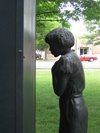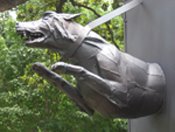I spent the past long weekend at The Lake, a tiny place in north Georgia that has meant the world to our family for over 60 years.
We still stay in my grandparents' cabin when we go, though now it belongs to my Uncle Buddy and has had several improvements since its days as a one-room cabin. It was mighty sweet back then, though, and full to bursting with love and my grandmama's spunk.
The cabin wasn't quite so full of family this trip--just the four of us for a good chunk of the time. And I had some time to go through the keepsakes still in Grandmama's chest of drawers. Her college scrapbook from the twenties is there, along with her wedding dress, her oldest daughter Sunny's baby books, and a picture of the flower-piled cemetery the day after little Sunny died. I've been to that cemetery now, so I recognize it when I see it.
It's different being there now--I have a new lens for looking closely. I know more, understand more, ask different questions, feel through it in a different way.
This time, I even went through the drawer of Granddaddy's slides. The phrase "gold mine" is trite and over-used, but it fits. When you first open the drawer, you notice that it's tumbled-up and disorganized, though most all the slides are in boxes. Some are labeled correctly, some are mislabeled, and many have no notations at all. So when you pull out a box and start popping slides in the viewer, there's no telling what you'll find.
But, oh, goodness, once you really dig in, the
life that streams out of that drawer!
Granddaddy loved photography--he had lots of equipment, and even developed his own pictures (though not the slides, of course). And looking at the slides, just me and that lit-up 2x2 square of color, is about the closest I can come to being inside his head, seeing what he saw. Loving what he loved.
There are photos from their travels all around the world: Cuba, Panama, Chile, Ecuador, Rome, France, Luxembourg, Scotland, England, California, New York City, Mt. Ranier, The Lake. And there are pictures of people, mostly family. Us. Some posed, some not. Pictures of us swimming, playing, concentrating, eating, talking, smiling at him. Loving him back.
And he's in a lot of the pictures, too. I have lots of memories of waiting, posing while he got it all set up, then all of us counting together, eager with anticipation as he ran around and joined us just in time for the shutter to capture the moment with him in it.
But there's one roll of pictures that's completely different. No people, no exotic places. Just the lake, the changing fall trees, their house in Macon. A few simple images. It's from October of 1977, just three months before Granddaddy died of cancer. He knew he was going, and through the lens of his camera, he said goodbye.
Goodbye again, my granddaddy.
A POSTSCRIPT . . . After writing this piece this morning at the lake, I came home and learned that my Aunt Martha, my mom's younger sister, had drifted peacefully away in her sleep in the wee hours at the hospice facility in Cincinnati.
Safe travels, Martha. We all love you dearly.



